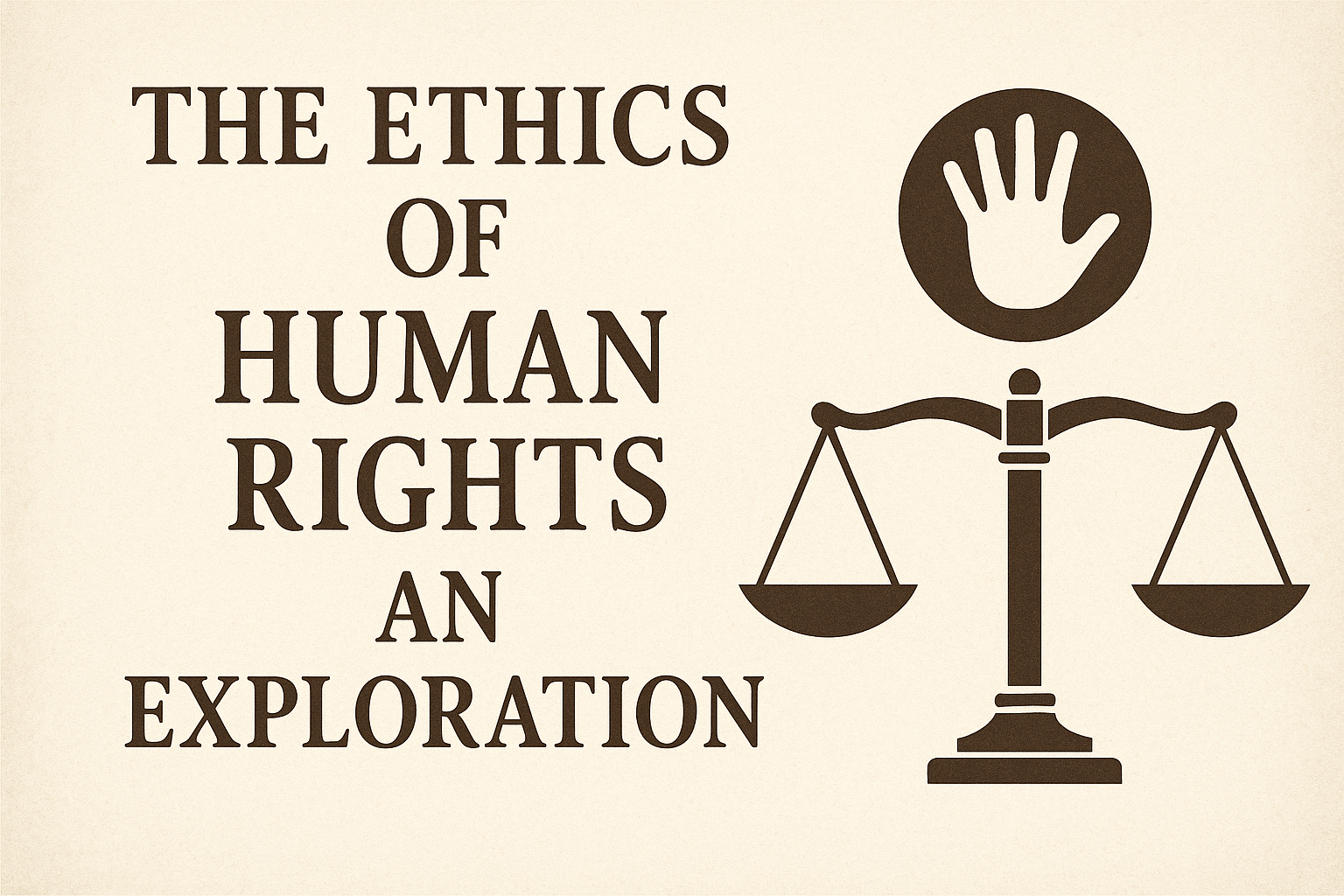Written By Dr. Babita Srivastava, Assistant Professor, Philosophy Faculty of Law, C.M.P. Degree College
Introduction
A human right is a conceptual device that priorities, promotes for all human being certain values identities and abilities necessary for an optimal human existence. Human rights are founded on the central moral claim that all human beings are born equal in dignity and thus they belong to an individual simply because of his humanness. Human rights belongs to each and every human being irrespective of his nationality, race, caste, crud, gender or any other consideration. They are neither created by nor can be abrogated by any government. Human rights protect people against torture under constraints on their freedom and guarantee certain liberties.
The scope of human rights being wide, constitutions of countries enshrine these basic rights that are necessary for ensuring an adequate human existence. The system of human rights embodies the vision of a free, equitable and peaceful world. It circumscribes minimum standards in the light of which individual and institutions everywhere should treat people.
Human rights are maintained and adhered to as fundamental rights, when they are guaranteed by a, written constitution, because a written constitution embodies, the fundamental law of the state. Human rights are prerequisites of a just, well-ordered society.
The idea of human rights lay at the core of the American and the FrenchRevolution. The term of “Human Rights” was introduced in the United States Declarationof Independence in 1776.
Human rights are necessary for the fulfillment of the purpose of life. Human lifehas a purpose. Human rights provide and protect ground level adequate standards ofliving for people, allowing them to fulfill the purpose of their any country does not havethe power to take away or curtail rights that are sacrosanct, inviolable and immutable.
Foundations of Human Rights
Human rights are universal – they are not privilege of any special person or group of persons. Dignity and equality are important components of human nature on which human rights are grounded.
Human rights have been discussed from three perspectives –
(a) The philosophical
(b) The legal and
(c) The political
Each of three perspectives has its district way and intent of discussion human rights.
The philosophy of rights seeks to investigate the foundations upon which appeal to human rights may be justified and sustained. Diverse foundational grounds have been suggested like the existence of a deity. Self-evidence and human need, more recently, the post-modernist turn in philosophy denies any kind of foundationalism. Though all these approaches have been extensively discussed and debated, natural rights foundationalism continues to dominate most mainstream human rights talk.
In early times the natural rights theory held that God bestowed man with natural rights. But in modern discourse we understand natural rights as being derived from the very humanness of man. This view, where rights derive from the very fact of humanity, is secular.
Thus, all human beings have the same and equal rights are also inalienable and they are universal in the sense that today we consider all are members belonging to the category human beings to be right holders.
The legal discourage on human rights derives elements from a large body of international law. The universal declaration of human rights (UDHR) and the two major covenants one on civil and political rights and the other on economic social and cultural rights are major parts of this discourse.
The political discourse is concerned with authority power and interests associated with particular conceptions of rights. The political discourse investigates why certain interests are upheld by philosophical theories and legal systems.
A survey of the origin and evolution of human rights shows that apart from the historical documents of human rights, religious humanism and ancient scriptures and traditions have significantly influenced our secular and modern understandings of rights.
Cultural and Historical Influences
The theories of divine revelation and divine command have lost ground today, but the altruistic message of religious texts like the Bible. The New Testament, The Koran, The Vedas, Dhammapada, etc. are imbibed at least in theory if not in practice. The teaching of universal brotherhood and fellow feeling of different religious texts inspire in human rights an inclusive approach to all, in political, economic and social matters.
The message of benevolence and universal is clear in both Buddhism and Jainism. Buddha denounced the caste system of Hinduism and the privileges based on birth. According to Buddha hierarchy should be based on birth but on the possession of superior qualities and character Buddha maintained that a man could not be called a Brahmin solely on the bases of his birth rather a person who possessed knowledge and wisdom and could discriminate between rights and wrong was more worthy of being called a Brahmin.
The most original and positive contribution of both Hinduism and Buddhism to the recent development of right was their deep concern for animal welfare and preservation of environment. We may say that the concern for ecological balanced and the protection of environment of the late 20th century had its roots in Hinduism and Buddhism.
Both Buddhism and Jainism are based on humanitarian feelings and emphasize good will towards every living creature. These religions have strong ethical underpinnings and generally uphold the following kinds of freedom.
1. Freedom of violence (ahimsa)
2. Freedom from want (asteya)
3. Freedom from exploitation (aparigrah)
4. Freedom from early death and disease (arogya)
These freedoms are inspired by virtues namely absence of intolerance (akrodha) compassion (bhutadaya), and knowledge (jnana), freedom of conscience, freedom from fear frustration and despair (pravrtti, abhaya and dhrti).
Like Buddhism Chinese ethical thinking emphasizes a sympathetic attitude towards one’s fellow beings, recognizing that they have the same desires, and aspirations and hence are entitled to the same human rights as any person would like to enjoy. – Toote Ching by Lao-tzu, a possible older contemporary of conjunctions, articulates several crucial rights ideas, including notions that are antecedent to the right to peace and human security.
Classical Western Thought
The Greeks and Romans had a great influence on human right as the existed in the 18th century. The foundation of a universal empire under Alexander the great temporarily stopped the nations of waging war against each other. In fact, Kant remarked –
“This idea of a universal empire become the Greek ideal of a perpetual peace, such an empire was, in the language of the stoics, a world state in which all men had rights of citizenship in which all other nations were absorbed.”
In Plato’s republic it is mentioned how Socrates imagined that a person became invisible on wearing the mythical ring of Gyges. Socrates believed that goodness is universal both Socrates and Plato subscribed to a universal view of human spirit of human goodness Socrates and Plato refuted the Sophist’s claim that goodness and justice are not absolute but are relative to the customs of each society. Socrates maintained that justice was a state in which all people knew and accepted their positions in the scale of three classes, and in which people were controlled and guided were the wisdom of the guardian class.
The University aspect of Human rights is something understood to indicate that all cultures combined and contributed to the formulation of human rights. Ramcharan explains this as follows – “As civilizations interacted and learnt from one another, concepts of dignity, law, freedom, equality, liberty, and rights developed over time.
In this Article, I have explained the general nature of human rights, which are fundamental building blocks of our society. In order to ensure the safety of our rights and to understand the foundations of our rights, which make our rights universal understood as an Ethics of Recognition of human worth, dignity and rights.
References
1. Kant, Immanuel (1903) perpetual peace: A philosophical Essay. Translated with
introduction and Notes by M.Cambell, Smith, with a preface by professor Latta.
London: George Allen & Unklin Ltd. First Edition 1903, pp. 31-32.
2. Bertrand, G. Ramchanran, “The University of Human Rights”, International
Commission of Jurists Review, 1994, p.105.

